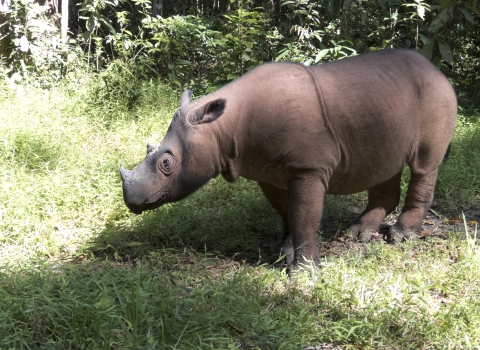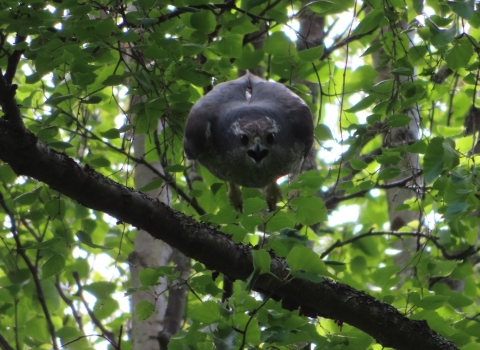A new study, “Challenges in Assessing the Effects of Environmental Governance Systems on Conservation Outcomes” was co-authored by staff from our International Affairs (IA) program, the World Wildlife Fund, the Canadian Centre for Evidence Based Conservation, International Union for Conservation of Nature, and various academic institutions1. Published in the October 17, 2024, edition of Conservation Biology, it sheds light on a crucial factor in conservation success that often flies under the radar - governance.
It turns out that how conservation efforts are managed, and the context in which they take place, can be just as important as the actions themselves. From ensuring proper use of funding to engaging local communities, effective governance lays the groundwork for meaningful outcomes. Without it, even the best-funded projects can struggle. This study underscores the need for more robust research and better data on governance to guide conservation efforts worldwide.
After a comprehensive analysis of conservation projects across Africa, Asia, and Latin America, the research team found that despite widespread acknowledgement of the importance of governance for conservation outcomes, the world is severely lacking the empirical data needed to prove just how crucial good governance is to keeping wildlife thriving. "Effective governance is essential for conservation projects, but our findings show that the current evidence base is remarkably limited," said Dr. Matt Luizza, IA program officer of the African Elephant Conservation Fund and one of the lead authors. "There is a significant gap in our understanding. It's almost impossible to answer the question, ‘Do different types of governance lead to better or worse conservation outcomes?’ We simply need more empirical research."
The newly released Protected Planet Report, by the United Nations Environment Programme World Conservation Monitoring Centre (UNEP-WCMC) and International Union for Conservation of Nature (IUCN), underscores the lack of data. According to the report, only 0.2 percent of land-based and less than 0.01 percent of marine protected areas have had governance assessments, and less than four percent of all protected areas are governed by Indigenous Peoples and local communities.
You still might be asking, “What’s governance got to do with wildlife?” Well, a lot more than you might think! Governance refers to the systems, policies, and people that guide how conservation decisions are made and carried out - and it comes in many forms. Governance can range from approaches led by Indigenous Peoples and local communities to government-led approaches and various hybrid models in between. Governance is not "one-size-fits-all" for effectiveness because its complexity and multi-faceted nature make it challenging to study. And it’s worth it. Strong governance can help ensure funding is used effectively, decisions are inclusive of local communities, and conservation projects run smoothly even when the “going gets tough.”
Take African elephants, for example. Another recent study published in Conservation Letters, and supported by IA’s African Elephant Conservation Fund, uncovered that the success of elephant conservation across sub-Saharan Africa hinges on two key ingredients: funding and governance. Despite a $1.5 billion annual funding gap needed to stabilize elephant populations, the study showed that sites with effective governance were able to slow population declines. It’s a powerful reminder that even in underfunded times, leadership, accountability, and transparency matter.
How We Can Lead the Way
The study outlines a few ways we can continue to make sure conservation leaders have the tools they need to succeed:
- Support Empirical Research/Support On-the-Ground Research: Increase funding and support for studies that can clearly link governance practices to both successful and unsuccessful conservation outcomes. (We must remember understanding failures is important too.)
- Improve Data Collection and Sharing: Work towards enhancing the quality and availability of governance data in accessible databases, ensuring that this information can support comprehensive research and informed decision-making, while respecting data sovereignty of Indigenous Peoples.
- Apply Standardized Frameworks and Develop Consistent Indicators: Apply existing governance frameworks and create and use standardized tools and indicators to measure how governance impacts conservation, making it easier to compare results across different projects and regions.
- Encourage Interdisciplinary Approaches: Foster collaborations between researchers, practitioners, local communities, and decision-makers from various fields to promote mutual learning and co-production of knowledge.
Elephants Aren’t the Only Ones Benefiting from Better Governance
Governance might sound like something that only policy insiders worry about, but it plays a huge role in shaping the future of wildlife conservation. From elephants in sub–Saharan Africa to the wetlands in the United States, strong governance ensures that every dollar spent on conservation is a dollar well spent. It helps us work with local communities to protect their homes and the wildlife that call these places home too. When we prioritize governance, we demonstrate our commitment to our values of stewardship, integrity, respect, collaboration, and innovation, ensuring these principles guide every aspect of our conservation efforts.
As the challenges facing wildlife continue to grow, studies like these offer a clear roadmap for how we can shift the momentum in favor of effective conservation. Whether it's stabilizing elephant populations or supporting endangered species closer to home, one thing is certain: strong governance isn't just helpful—it's essential. Governance is one of best tools in our conservation toolbox.
Dr. Hila Levy, IA's new Assistant Director, echoed this sentiment, “This paper is a testament to the recent initiatives by our Division of International Conservation and our global partners to prioritize evidence-based conservation. By focusing on robust research and data-driven strategies, we're ensuring that conservation efforts are not only well-intended but effective in the long run.”
So, next time you hear the word “governance," think of it as the sturdy foundation of a house. Without it, everything else falls apart. And we are so proud to see our Division of International Conservation committed to making sure that foundation is rock solid.
_____________________
1University of Manitoba, Carleton University, University of Waterloo, University of British Columbia, and Ohio State University








